Old Town attracts new entrepreneurial spirit
An ancient settlement is thriving in the wake of renovation work. Cui Jia reports from Kashgar, Xinjiang Uygur autonomous region.

When Mardan Ablimit opened a coffee shop in the Old Town of Kashgar, Xinjiang Uygur autonomous region, in 2018, many people warned him that his venture was unrealistic and bound to fail.
Now, the 34-year-old is considering opening branches outside the region and exporting a taste of Kashgar nationwide after the coffee shop successfully integrated with the Old Town and became part of local people's lives.
Mardan said the 4-square-kilometer Old Town, which has a history of more than 2,000 years, is "the birthmark of Kashgar" in southern Xinjiang. The traditional Uygur architecture and culture are well-preserved around the neighborhood and by its 43,000-plus residents, 97 percent of whom are members of the Uygur ethnic group.
"The Old Town has been a window into Kashgar ever since the city was an important stop on the ancient Silk Road. It has never stopped embracing new things and ideas," said Mardan as he sat in Kashgar Corner, his coffee shop.
"By having a cup of Kashgar Corner Special, made with coffee and traditional Uygur herbs and presented in a mug handmade by Uygur pottery craftsmen in the Old Town, I hope visitors will see both the traditional and modern sides of Kashgar."
In the past, the area's people and fragile old buildings were threatened by the risk of fire and earthquakes.
In 2010, the central government started a 7 billion yuan ($1 billion), four-year renovation project to render the buildings earthquake-proof while maintaining their traditional Uygur charm.
Nearly 50,000 families had their dilapidated old houses renovated under the project. Modern infrastructure and amenities have made people's lives easier and cozier. What's more, many young Uygurs, such as Mardan, have recognized the potential of the Old Town and discovered a passion for it.
The process of opening the coffee shop helped Mardan reconnect with the city where he was born and raised, he said.
After graduating from a university in Xi'an, capital of Shaanxi province, he chose a career as a film producer there because he didn't believe Kashgar could offer a platform for him to realize his dreams.
"I did not believe that Kashgar, China's westernmost city, could ever be as open as other cities in the country," he said.
He returned to Kashgar in 2010 at the request of his parents, who wanted him to take care of them, and started making documentaries about Kashgar prefecture for the local TV station.
He also made documentaries about the Old Town and witnessed its transformation. "Many elderly residents have told me that the improvement in their lives has been beyond their imaginations," Mardan said.
The renovation project was criticized by some Western observers, who called it a move to "extinguish the Uygur culture".
Mardan, who refers to himself "a new member of the Old Town community", said: "The fact is that the traditional Uygur architecture has all been preserved. The project has just modernized local people's lives. People who have doubts should come and see for themselves and ask the locals what they think."
He added that prior to the renovation project the house of a craftsman who makes the coffee mugs used at Kashgar Corner collapsed during a heavy rainstorm.
"Luckily, no one was hurt. He had to move out of the house during the renovation work. After he moved back to the reinforced house, he continued to make traditional Uygur pottery. Nothing has changed," Mardan said.
Changed lives
The renovation project has changed the lives of Mardan and his wife. In 2017, while strolling with his wife, who had a dream of opening a coffee shop in Kashgar, Mardan noticed that a recently renovated two-story building at a crossroads in the Old Town was being offered for rent.
The couple immediately fell in love with the dusty building, believing it to be the ideal location for their coffee shop.
Having rented the building they started to fill it with old furniture and decorations they had collected from flea markets, such as a sign from a 1980's tailor's shop, and they used old doors as tables and hung pictures of Kashgar in old window frames.
"I just want the coffee shop to be a place to showcase Kashgar as it was in the old days. It's my responsibility to preserve our culture and present it in a modern way," Mardan said. At the time, many observers doubted that the tea-loving Uygurs would accept coffee and even the young couple wondered if people would come to the Old Town to try it.
Despite their concerns, Kashgar Corner opened for business in 2018, just as the city's tourism boom began. Last year, Kashgar hosted more than 8.8 million tourist visits, a rise of 59 percent year-on-year.
Back in 2018, Xinjiang's social situation gradually stabilized after a number of anti-extremist and anti-terrorism measures were put in place. For a period, terrorist attacks happened frequently in Kashgar prefecture, which made people afraid to travel there.
At first, the coffee shop's customers were mainly tourists, who often packed the premises at peak times. Gradually, local residents of the Old Town also developed the habit of drinking coffee, just as they have become accustomed to hearing a young musician playing the popular Western song Despacito on the rawap (a traditional five-stringed Uygur instrument) at a famous centuries-old teahouse in the Old Town.
Dilnar Akbar, Mardan's wife, said she is no longer surprised to see 70-something locals ordering coffee instead of tea.
"They told me that the decor in Kashgar Corner reminds them of the old times, and they find the aroma of the coffee quite alluring. For them, it is always a good thing to have another place to have a chat in the afternoon," she said.
When she was 16, Dilnar left Kashgar to attend a senior high school in Shenzhen, Guangdong province, before going to a university in the northern port city of Tianjin.
During her time outside the region, she became a coffee lover. "My experiences outside Xinjiang opened my eyes. I am glad I can bring new ideas back to our city, which is thirsty for development," she said.
When Kashgar Corner opened, it was one of only two coffee shops in the Old Town, and the rival was struggling. Now there are seven establishments, according to Mardan. "Drinking coffee is no longer an exotic thing, but a part of the daily routine in the Old Town," he said.
When the COVID-19 outbreak started to spread in China earlier this year, the couple was worried that the coffee shop's business would be hit hard because the number of tourists would drop sharply. Despite their fears, local customers have helped to keep Kashgar Corner afloat.
Blend of cultures
Mewlan Turaq, 27, owns a clothing boutique in the Old Town. He designs and displays over a dozen pieces of Uygur clothing in the shop, illustrating the changes in the traditional clothing during the past century.
The clothing is very popular with tourists, along with other products such as vintage accessories, bags and even mobile phone cases decorated with Uygur patterns.
Many travelers enjoy renting the clothes and paying photographers to take pictures of them in the Old Town.
Inspired by the popular 100 Years of Beauty video, which highlights changes in fashion trends in a country or region over time, Mewlan and his team released their own video in 2017 to look back on trends in Uygur women's fashion during the past century.
In the two-minute video, Mewlan illustrates the evolution of Uygur fashion in Kashgar from the 1910s to the 2010s.
"We can see that time has left different marks on our clothes, and different cultures have blended. The cultures of East and West have met and melded in Kashgar, an important trading post on the ancient Silk Road, and that shows in the evolution of local fashion," Mewlan said.
He said his inspiration comes from the Old Town itself. When he wanders down the winding alleyways the shape of a window, the patterns on a carpet or the intricate carving on a wooden ornament can be his muse.
"The more I get to know about the history of the city and the beautiful stories about it, the more I come to love it," he said.
Mardan, Mewlan and other young Uygur entrepreneurs in the Old Town often get together and discuss how they can bring out the modern side of Uygur tradition and help people learn more about it.
"The Old Town is a platform for us to share our values and ideas. It inspires us in the exact same way it has inspired the traditional craftsmen of pottery, bronzeware and musical instruments for generations," Mardan said.
"The Old Town is small, but it's also big enough to carry our ambitions."
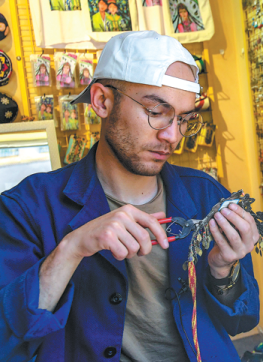
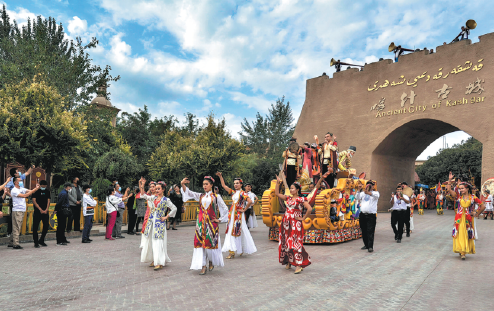
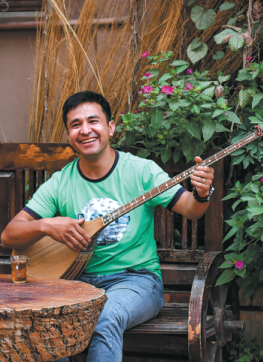
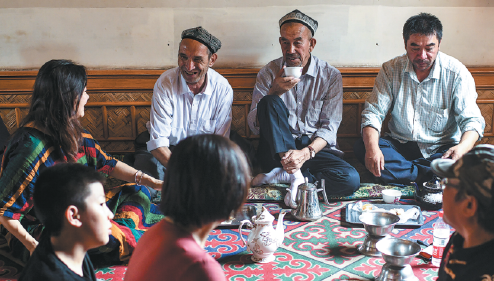
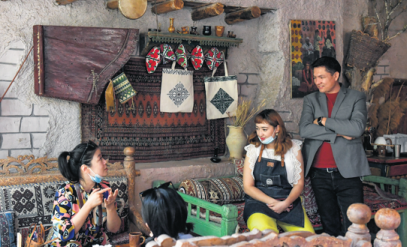
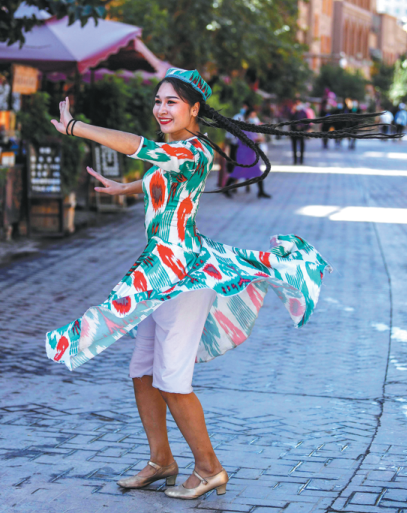
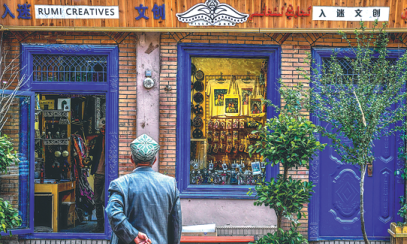
Today's Top News
- Wang calls Rubio meeting constructive
- Tianzhou 9 cargo craft transported to launch site
- Gaokao not only way to be successful in life
- More policy options in H2 to spur growth
- Shipping industry advances green efforts
- China supports Egypt in playing a bigger role






























